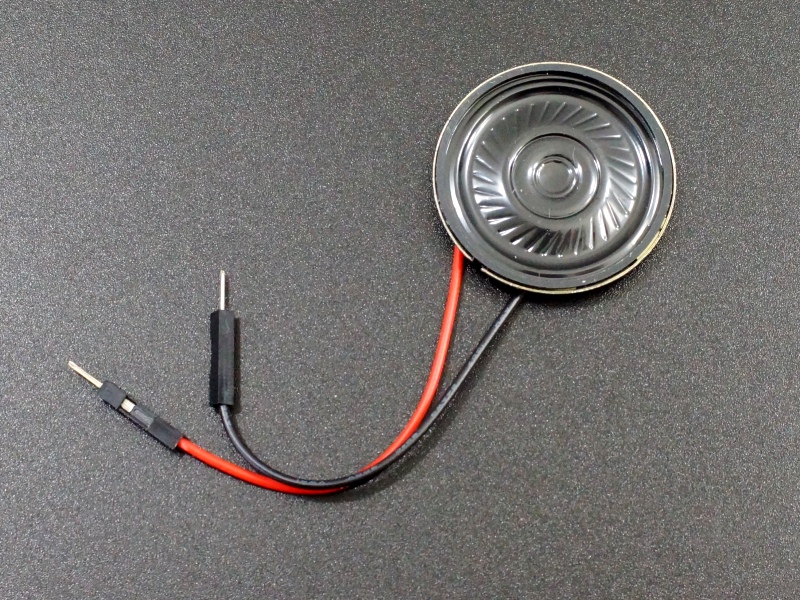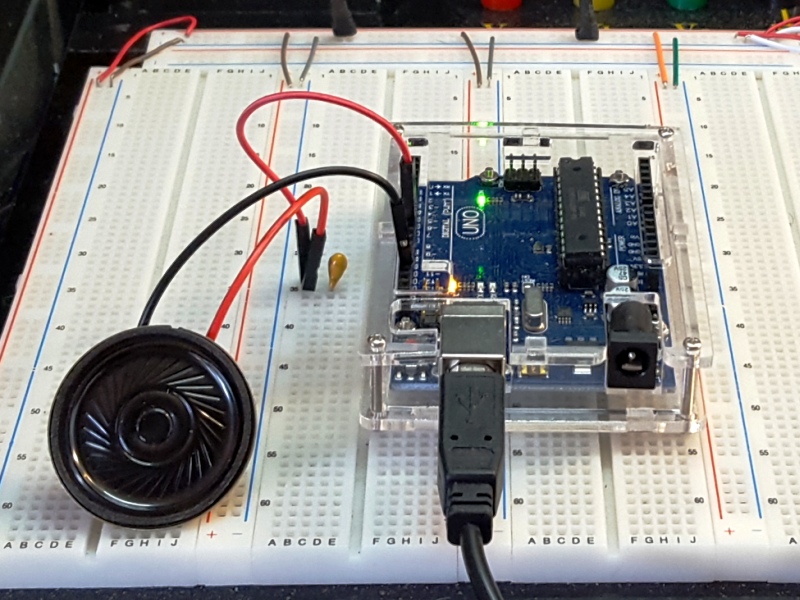Speaker 36mm 0.5W 8 Ohm with Breadboard Jumpers
$1.49
Small speaker with attached solderless breadboard jumper wires for easy prototyping.
Out of stock
Description
This is a 36mm diameter 0.5W 8 Ohm speaker with attached solderless breadboard jumper wires.
PACKAGE INCLUDES:
- Speaker 36mm 0.5W 8 Ohm with Breadboard Jumpers
KEY FEATURES OF SPEAKER 36MM 0.5W 8 OHM WITH BREADBOARD JUMPERS:
- Approximately 80Hz to 12kHz frequency response
- 36mm Outside diameter w/ plastic cone
- Very thin depth of 5mm
- 0.5W power handling w/ 8 Ohm impedance
- Male solderless breadboard jumpers attached
These small speakers work well for adding a little sound to your next breadboarding project.
Speaker Connections
These have 3″ long breadboard jumper wires added to them to make them breadboard friendly.
For use with an MCU, the black ‘-‘ black wire is connected to the system ground and the ‘+’ red wire is connected to a digital output pin from the MCU or a small audio amplifier. A series capacitor of around 10uF – 47uF should be used in series with the drive pin to prevent DC current flow and avoid possible damage to the MCU output if driving directly off the MCU.
If a louder sound is desired, a transistor, LM386 audio amp or other amplifying device can be placed in-circuit to provide a stronger drive to the speaker.
Our Evaluation Results:
These speakers work very well for adding sound to a project. They are not hi-fi quality but work fine for basic sound reproduction.
There are several code examples built into the Arduino IDE for playing basic notes on a speaker. One ‘toneMeloday’ is shown below. Remember to connect a series cap between the output pin and the buzzer to avoid possible damage to the Arduino or use an amplifier of some type.
Speaker Example Program
/* Melody Plays a melody circuit: - 8 ohm speaker on digital pin 8 created 21 Jan 2010 modified 30 Aug 2011 by Tom Igoe This example code is in the public domain. http://www.arduino.cc/en/Tutorial/Tone */ #include "pitches.h" // notes in the melody: int melody[] = { NOTE_C4, NOTE_G3, NOTE_G3, NOTE_A3, NOTE_G3, 0, NOTE_B3, NOTE_C4 }; // note durations: 4 = quarter note, 8 = eighth note, etc.: int noteDurations[] = { 4, 8, 8, 4, 4, 4, 4, 4 }; void setup() { // iterate over the notes of the melody: for (int thisNote = 0; thisNote < 8; thisNote++) { // to calculate the note duration, take one second divided by the note type. //e.g. quarter note = 1000 / 4, eighth note = 1000/8, etc. int noteDuration = 1000 / noteDurations[thisNote]; tone(8, melody[thisNote], noteDuration); // to distinguish the notes, set a minimum time between them. // the note's duration + 30% seems to work well: int pauseBetweenNotes = noteDuration * 1.30; delay(pauseBetweenNotes); // stop the tone playing: noTone(8); } } void loop() { // no need to repeat the melody. }
Notes:
- None
Technical Specifications
| Maximum Ratings | ||
| Max Power | 0.5W | |
| Impedance | 8 Ohm | |
| Frequency Response | 80Hz – 12KHz | |
| Dimensions | Dia x H | 36 x 5mm (1.42 x 0.2″) |
| Country of Origin | China |



